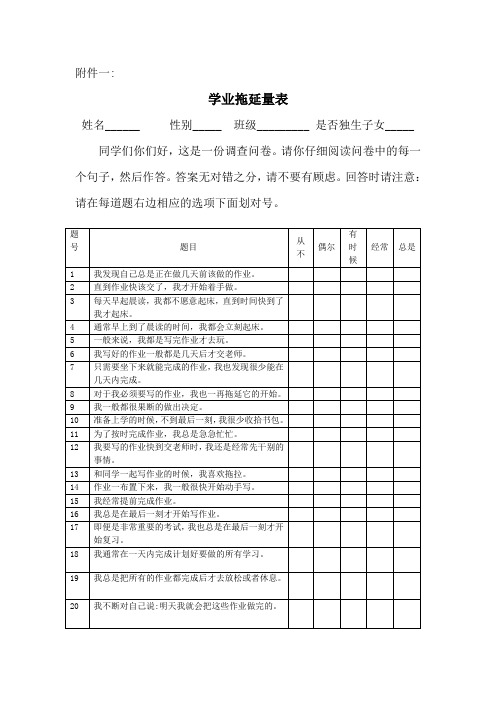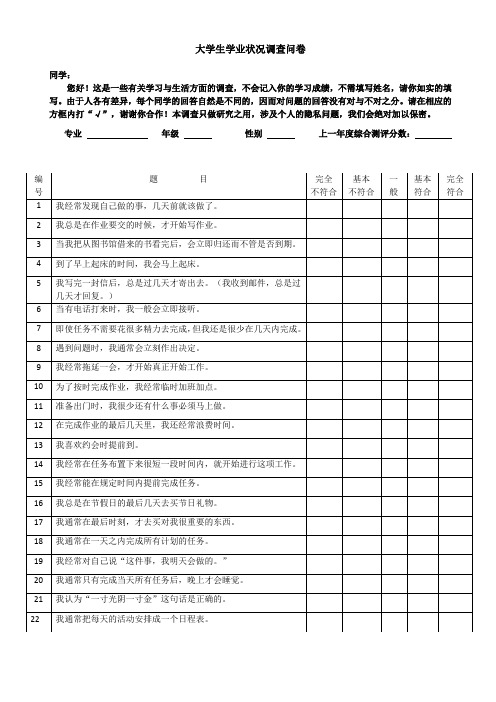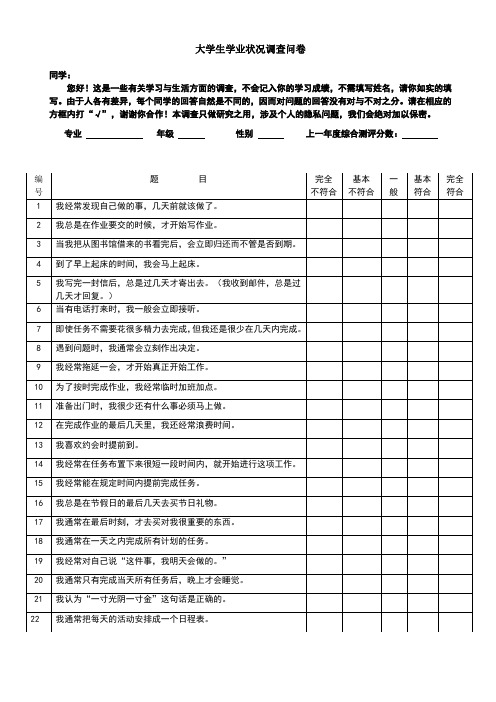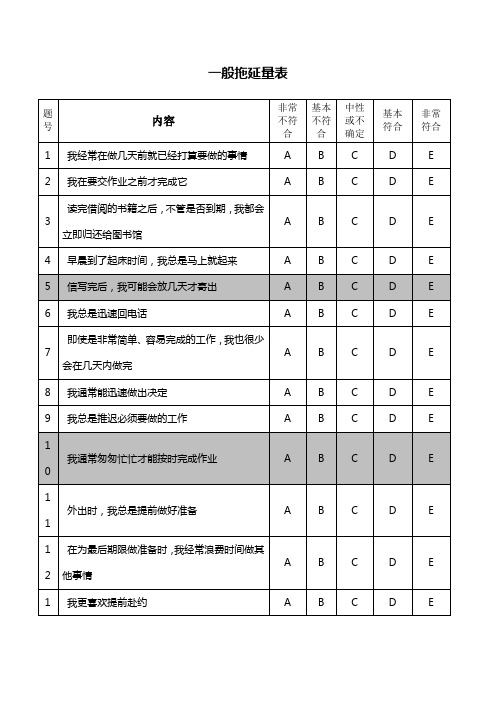一般拖延量表
学生拖延量表

附件一:
学业拖延量表
姓名______ 性别_____ 班级_________ 是否独生子女_____ 同学们你们好,这是一份调查问卷。
请你仔细阅读问卷中的每一
个句子,然后作答。
答案无对错之分,请不要有顾虑。
回答时请注意:
请在每道题右边相应的选项下面划对号。
注:《学业拖延量表》使用国外学者Lay编制的学业拖延量表,共由二十个描述与学业拖延相关的行为和感觉的项目组成(如:对于我必须要写的作业,我也一再拖延它的开始)。
该量表选择项采用五选一的等级排列来反映学生学业拖延行为的水平,从“从不”到“总是”分别为1分到5分,其中没有=1分,偶尔=2分,有时=3分,经常=4分,总是=5分。
量表所含题目的SD-B折半信度为0.73一0.75之间,以及量表的题目间Cronbach’a内部一致性信度系数为0.764,所以该量表可以作为评鉴小学生学业拖延的有效工具。
附录二:
教师访谈提纲
1、你的学生中有没有学习拖延的的现象?
2、你觉察到学生的学习拖延常常会有什么样的表现?
3、你觉得造成学生学习拖延的原因有哪些?
4、你有没有尝试着去减轻学生的学习拖延呢?你觉得有效的方法有哪些?
家长访谈提纲
1、你的孩子有没有学习拖延的的现象?
2、你觉察到孩子的学习拖延常常会有什么样的表现?
3、你觉得造成孩子学习拖延的原因有哪些?
4、你有没有尝试着去减轻孩子的学习拖延呢?你觉得有效的方法有哪些?。
拖延症测试

拖延症测试:你离超级“名磨”还有多远据调查,九成上班族都有拖延症。
你的拖延症程度有多严重?赶快来测试一下!以下测试,摘自《拖延心理学2》一书,作者为皮尔斯-斯蒂尔。
既然你已经明确了拖延是什么,那么,请你判定,你犯过拖延的毛病吗?在拖延的排行榜上,你排哪个位置呢?你只是那种普通的磨磨蹭蹭,还是已将“明天再说”这几个字深深地刻到了你的脊背上?有一些有趣的办法能测量你的拖延倾向有多重。
首先,我们来看看你的笔迹。
如果你写的字看上去无精打采、字形散乱,那么你本人的生活很可能也是类似的懒散和杂乱。
我们为你准备了一份测试量表,这份量表是我们根据上万名被试的情况编制的。
你可以看一下,跟全世界的人相比,你的非理性推迟水平的严重程度。
看看下面的拖延测试题目,圈出你对每道题的回答,然后把分数相加得出总分,就完成了。
计分方式:我不会或极少这样:计1分;我很少这样:计2分;我有时这样:计3分;我时常这样:计4分;我就是或总是这样:计5分。
第2题、第5题、第8题为反式计分,即由“我就是或总是这样”至“我不会或极少这样”的分数为1-5分。
将以下9道题的分数相加,即为拖延测试的总分数。
拖延症严重程度测试题目1.我将任务推迟到了不合理的程度。
2.不管什么事情,只要我觉得需要做,就会立即去做。
3.我经常为没有早些着手而后悔。
4.我在生活中的某些方面经常拖延,尽管明知道不应该这么做。
5.如果有我应该做的事情,我就会先做完它,再去做那些次要的。
6.我拖得太久,这令我的健康和效率都受到了不必要的影响。
7.总是到了最后,我才发现我其实可以把时间用在更好的地方。
8.我很妥善地安排我的时间。
9.在本该做某件事的时候,我却会去做别的事情。
拖延症严重程度测试结果分析19分及以下:轻微拖延,约占人群的10%,“要紧的事先做”是你的座右铭;20-23分:稍微拖延,约占人群的10%-25%;24-31分:平均水平的拖延,约占人群的50%;32-36分:严重拖延,约占人群的10%-25%;37分及以上:非常严重的拖延,约占人群的10%,“明天吧”是你的口头禅。
DMQ-决策拖延量表

题项
非常
不符合
比较
不符合
不确定
比较
符合
非常
符合
1.我总是在琐事上花费很多时间才能做出最终决定。
1
2
34Biblioteka 52.即使我做好了决定,我仍迟迟不愿行动。
题项
非常
不符合
比较
不符合
不确定
比较
符合
非常
符合
1.我总是在琐事上花费很多时间才能做出最终决定。
1
2
3
4
5
2.即使我做好了决定,我仍迟迟不愿行动。
1
2
3
4
5
3.迫不得已的时候我才做决定。
1
2
3
4
5
4.我总是到拖得不能再拖时才做决定。
1
2
3
4
5
5.我总是推迟做决定。
1
2
3
4
5
1
2
3
4
5
3.迫不得已的时候我才做决定。
1
2
3
4
5
4.我总是到拖得不能再拖时才做决定。
1
2
3
4
5
5.我总是推迟做决定。
1
2
3
4
5
请使用五个等级来评价这个描述和你的实际情况的相符程度,1—5表示符合程度逐渐加深,“1”表示非常不符合;“2”表示比较不符合;“3”表示不确定;“4”表示比较符合;“5”表示非常符合。
大学生学业拖延量表(修订)

大学生学业状况调查问卷再次感谢您的参与!时间价值感5、28、6、16、9(反向)个体取向11、39、1、3、31 社会取向时间监控观:10、4、15、17(-)、40设置目标;12、25、41(-)、8、2计划;33、7、19、22、27(-)优先级;21、44、38、26、43反馈性;42、14、34、37时间分配时间效能感:24、13、36、35、30(-)时间管理行为效能;18、29、20、23、32时间管理效能The Cognitive Failures Questionnaire (Broadbent, Cooper, FitzGerald & Parkes, 1982)The following questions are about minor mistakes which everyone makes from time to time, but some of which happen more often than others. We want to know how often these things have happened to your in the past 6 months. Please circle the appropriate number.Very often QuiteoftenOccasion-allyVeryrarelyNever1.Do you read something and find youhaven’t been thinking about it andmust read it again432102.Do you find you forget why you wentfrom one part of the house to theother432103.Do you fail to notice signposts on theroad432104.Do you find you confuse right and leftwhen giving directions432105. Do you bump into people432106.Do you find you forget whetheryou’ve turned off a light or a fire orlocked the door432107.Do you fail to listen to people’s nameswhen you are meeting them432108.Do you say something and realizeafterwards that it might be taken asinsulting432109.Do you fail to hear people speaking toyou when you are doing somethingelse4321010.Do you lose your temper and regret it4321011.Do you leave important lettersunanswered for days4321012.Do you find you forget which way toturn on a road you know well butrarely use4321013.Do you fail to see what you want in asupermarket (although it’s there)43210 14.Do you find yourself suddenly 43210wondering whether you’ve used aword correctly43210 15.Do you have trouble making up yourmind16.Do you find you forget appointments4321043210 17.Do you forget where you putsomething like a newspaper or a book43210 18.Do you find you accidentally throwaway the thing you want and keepwhat you meant to throw away – as inthe example of throwing away thematchbox and putting the used matchin your pocket43210 19.Do you daydream when you ought tobe listening to something43210 20.Do you find you forget people’snames21.Do you start doing one thing at home43210 and get distracted into doingsomething else (unintentionally)43210 22.Do you find you can’t quite remembersomething although it’s “on the tip ofyour tongue”43210 23.Do you find you forget what you cameto the shops to buy24.Do you drop things4321025.Do you find you can’t think of43210 anything to say。
大学生学业拖延量表(修订)

大学生学业状况调查问卷再次感谢您的参与!时间价值感5、28、6、16、9(反向)个体取向11、39、1、3、31 社会取向时间监控观:10、4、15、17(-)、40设置目标;12、25、41(-)、8、2计划;33、7、19、22、27(-)优先级;21、44、38、26、43反馈性;42、14、34、37时间分配时间效能感:24、13、36、35、30(-)时间管理行为效能;18、29、20、23、32时间管理效能The Cognitive Failures Questionnaire (Broadbent, Cooper, FitzGerald & Parkes, 1982)The following questions are about minor mistakes which everyone makes from time to time, but some of which happen more often than others. We want to know how often these things have happened to your in the past 6 months. Please circle the appropriate number.Very often QuiteoftenOccasion-allyVeryrarelyNever1.Do you read something and find youhaven’t been thinking about it andmust read it again432102.Do you find you forget why you wentfrom one part of the house to theother432103.Do you fail to notice signposts on theroad432104.Do you find you confuse right and leftwhen giving directions432105. Do you bump into people432106.Do you find you forget whetheryou’ve turned off a light or a fire orlocked the door432107.Do you fail to listen to people’s nameswhen you are meeting them432108.Do you say something and realizeafterwards that it might be taken asinsulting432109.Do you fail to hear people speaking toyou when you are doing somethingelse4321010.Do you lose your temper and regret it4321011.Do you leave important lettersunanswered for days4321012.Do you find you forget which way toturn on a road you know well butrarely use4321013.Do you fail to see what you want in asupermarket (although it’s there)43210 14.Do you find yourself suddenly 43210wondering whether you’ve used aword correctly43210 15.Do you have trouble making up yourmind16.Do you find you forget appointments4321043210 17.Do you forget where you putsomething like a newspaper or a book43210 18.Do you find you accidentally throwaway the thing you want and keepwhat you meant to throw away – as inthe example of throwing away thematchbox and putting the used matchin your pocket43210 19.Do you daydream when you ought tobe listening to something43210 20.Do you find you forget people’snames21.Do you start doing one thing at home43210 and get distracted into doingsomething else (unintentionally)43210 22.Do you find you can’t quite remembersomething although it’s “on the tip ofyour tongue”43210 23.Do you find you forget what you cameto the shops to buy24.Do you drop things4321025.Do you find you can’t think of43210 anything to say。
大学生学业拖延量表

大学生学业状况调查问卷再次感谢您的参与!时间价值感5、28、6、16、9(反向)个体取向 11、39、1、3、31 社会取向时间监控观:10、4、15、17(-)、40设置目标;12、25、41(-)、8、2计划;33、7、19、22、27(-)优先级;21、44、38、26、43反馈性;42、14、34、37时间分配时间效能感:24、13、36、35、30(-)时间管理行为效能;18、29、20、23、32时间管理效能The Cognitive Failures Questionnaire (Broadbent, Cooper, FitzGerald & Parkes, 1982)The following questions are about minor mistakes which everyone makes from time to time, but some of which happen more often than others. We want to know how often these things have happened to your in the past 6 months. Please circle the appropriate number.Very often QuiteoftenOccasion-allyVeryrarelyNever1.Do you read something and find youhaven’t been thinking about itand must read it again?4 3 2 1 02.Do you find you forget why youwent from one part of the house tothe other?4 3 2 1 03.Do you fail to notice signposts onthe road?4 3 2 1 04.Do you find you confuse right andleft when giving directions?4 3 2 1 05. Do you bump into people? 4 3 2 1 06.Do you find you forget whetheryou’ve turned off a light or afire or locked the door?4 3 2 1 07.Do you fail to listen to people’snames when you are meeting them?4 3 2 1 0 8.Do you say something and realizeafterwards that it might be takenas insulting?4 3 2 1 09.Do you fail to hear peoplespeaking to you when you are doingsomething else?4 3 2 1 010.Do you lose your temper and regretit?4 3 2 1 0 11.Do you leave important lettersunanswered for days?4 3 2 1 0 12.Do you find you forget which wayto turn on a road you know well butrarely use?4 3 2 1 013.Do you fail to see what you wantin a supermarket (although it’s4 3 2 1 0there)?14.Do you find yourself suddenly4 3 2 1 0wondering whether you’ve used aword correctly?4 3 2 1 0 15.Do you have trouble making up yourmind?16.Do you find you forget4 3 2 1 0appointments?4 3 2 1 0 17.Do you forget where you putsomething like a newspaper or abook?18.Do you find you accidentally4 3 2 1 0throw away the thing you want andkeep what you meant to throw away– as in the example of throwingaway the matchbox and putting theused match in your pocket?4 3 2 1 0 19.Do you daydream when you ought tobe listening to something?20.Do you find you forget people’s4 3 2 1 0names?4 3 2 1 0 21.Do you start doing one thing athome and get distracted intodoing something else(unintentionally)?4 3 2 1 0 22.Do you find you can’t quiteremember something althoughit’s “on the tip of yourtongue”?4 3 2 1 0 23.Do you find you forget what youcame to the shops to buy?24.Do you drop things? 4 3 2 1 025.Do you find you can’t think of4 3 2 1 0anything to say?。
一般拖延量表

A
B
C
D
E
13
我更喜欢提前赴约
A
B
C
D
E
14
我通常在作业布置之后很快开始做它
A
B
C
D
E
15
我通常提前完成任务
A
B
C
D
E
16
我似乎总是到最后一刻才去选购生日或节日礼物
A
B
C
D
E
17
即使是必需品,我也通常拖到最后一刻才买
A
B
C
D
E
18
我通常会完成一天内计划好的所有事情
A
B
C
D
E
19
我经常说“明天再做”
A
一般拖延量表
题号
内容
非常不符合
基本不符合
中性或不确定
基本符合
非常符合
1
我经常在做几天前就已经打算要做的事情
A
B
C
D
E
2
我在要交作业之前才完成它
A
B
C
D
E
3
读完借阅的书籍之后,不管是否到期,我都会立即归还给图书馆
A
B
C
D
E
4
早晨到了起床时间,我总是马上就起来
A
B
完整word版)一般拖延量表

完整word版)一般拖延量表简要介绍拖延的概念和对个人生活和工作的负面影响。
引出《一般拖延量表》的重要性和目的。
描述研究方法和参与者选择的过程。
说明量表的开发过程,包括项目的选取和量表项的编制。
列出《一般拖延量表》的各个项和子项。
说明每个___的评分标准和对应的解释。
提供使用《一般拖延量表》的步骤和操作建议。
强调量表的适用性和可行性。
总结《一般拖延量表》的研发过程和主要内容。
强调该量表对个人和组织进行拖延管理的重要性。
列出在研究过程中使用的参考文献。
注意:这只是大纲的概述部分,具体内容需要根据实际情况进行扩充和完善。
在这一部分,我们将介绍《一般拖延量表》的背景和目的,以及解释为什么这个量表对于研究拖延行为非常重要。
在现代社会,拖延已经成为许多人面临的常见问题之一。
拖延指的是推迟或延迟完成任务或决定的行为。
它不仅会对个人的工作、研究和生活产生负面影响,还会导致心理压力和焦虑。
了解拖延行为的成因和影响对于个人和社会都具有重要意义。
一般拖延量表》的目的是评估个体在面对不同任务时的拖延倾向程度。
通过量表的设计和应用,我们可以了解个体在处理任务时的拖延行为的频率和程度,并且可以分析其与其他因素(如个性特征、压力、自我调控能力等)之间的相关性。
这可以为研究拖延行为的成因和设计相应的干预措施提供重要依据。
对于研究拖延行为来说,《一般拖延量表》是一种适用于量化测量的工具。
该量表由专家团队精心设计,结合了前期研究和临床实践的经验。
通过使用这个量表,研究者可以获得客观的数据,对个体的拖延倾向进行量化评估。
这对于揭示拖延行为的特征和规律,进一步了解拖延行为对个体和社会的影响,以及制定相应的干预措施都具有重要意义。
通过介绍《一般拖延量表》的背景、目的和重要性,我们可以看到这个量表在研究拖延行为方面的价值。
它为研究提供了一种可靠且量化的测量工具,有助于揭示拖延行为的本质和影响因素,并为制定干预措施提供科学依据。
这一部分将描述《一般拖延量表》的基本信息,包括其被设计用于评估拖延行为的各个方面,以及量表的使用方法。
- 1、下载文档前请自行甄别文档内容的完整性,平台不提供额外的编辑、内容补充、找答案等附加服务。
- 2、"仅部分预览"的文档,不可在线预览部分如存在完整性等问题,可反馈申请退款(可完整预览的文档不适用该条件!)。
- 3、如文档侵犯您的权益,请联系客服反馈,我们会尽快为您处理(人工客服工作时间:9:00-18:30)。
一般拖延量表
一般拖延量表(学生版)为单因素结构量表,共20个项目,内容涉及学业活动、日常生活行为,如“我通常匆匆忙忙才能按时完成作业”、“我更喜欢提前赴约”等,采用Liker5点式评分法。
该量表具有较好的内部一致性信度和再测信度。
Ferrari (1992)在检验其心理测量效度后认为,在不同情境中,一般拖延量表(GP )都是测量拖延行为的有效工具。
题号
内容
非常不符合 基本不符合 中性或不确定 基本符合 非常符合 1 我经常在做几天前就已经打算要做的事情 A B C D E 2 我在要交作业之前才完成它 A B C D E 3
读完借阅的书籍之后,不管是否到期,我都会立即归还给图书馆
A B C D E 4 早晨到了起床时间,我总是马上就起来 A B C D E 5 信写完后,我可能会放几天才寄出 A B C D E 6 我总是迅速回电话 A B C D E 7
即使是非常简单、容易完成的工作,我也很少会在几天内做完
A B C D E 8 我通常能迅速做出决定 A B C D E 9 我总是推迟必须要做的工作 A B C D E 10 我通常匆匆忙忙才能按时完成作业 A B C D E 11 外出时,我总是提前做好准备 A B C D E 12
在为最后期限做准备时,我经常浪费时间做其他事情
A B C D E 13 我更喜欢提前赴约
A B C D E 14 我通常在作业布置之后很快开始做它 A B C D E 15 我通常提前完成任务 A B C D E 16
我似乎总是到最后一刻才去选购生日或节日礼物
A B C D E 17 即使是必需品,我也通常拖到最后一刻才买 A B C D E 18 我通常会完成一天内计划好的所有事情 A B C D E 19 我经常说“明天再做” A B C D E 20
在晚上娱乐休闲之前,我通常会处理好必须完成的所有任务
A
B
C
D
E
一般拖延量表(General Procrastination Scale,GPS)由Lay于1986年编制[6],共20个项目,采用Likert5点式评分法。
研究表明此问卷在我国大学生中有着良好的适用性[7],本研究采用以往应用于大学生的问卷条目,其的Cronbach’s a系数为0.807,分半系数0.808,同样表现出良好适用性。
评分标准:
计算量表得分按高低分排序,以拖延分值的高低15%作为被试筛选标准,确定出高、低拖延者,通知其在另外时间参加行为实验与问卷调查。
高低拖延者的冲动性特征与延迟折扣差异研究(此论文里有中英文版)。
